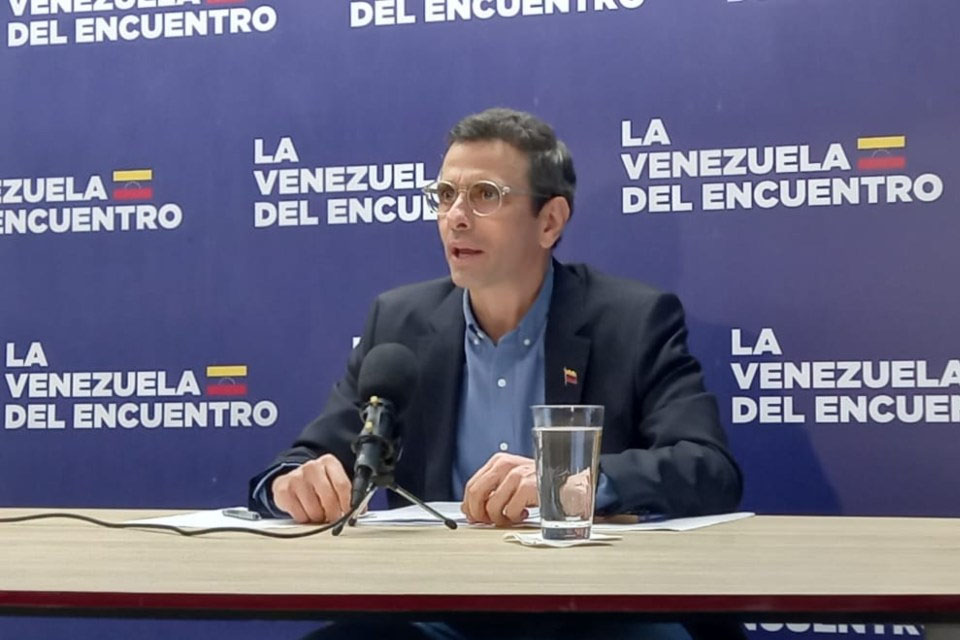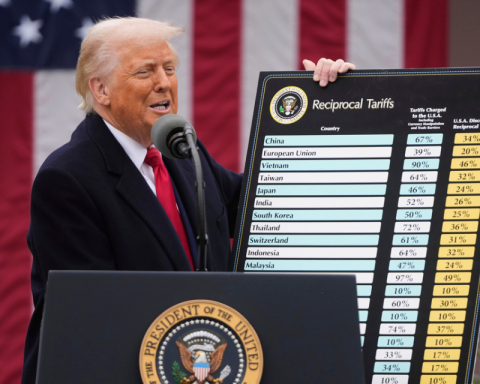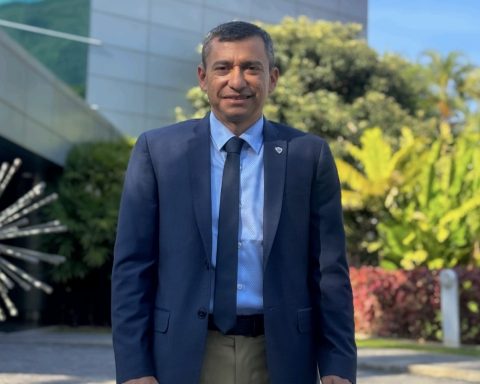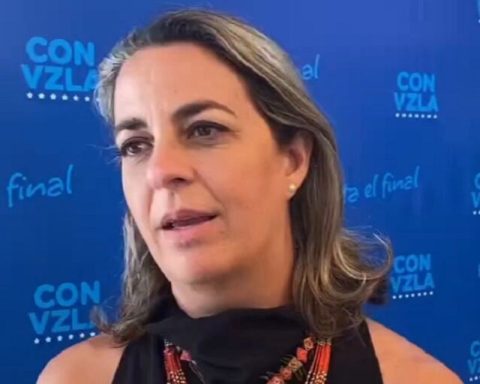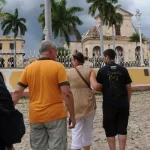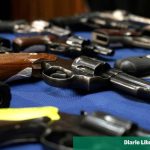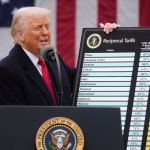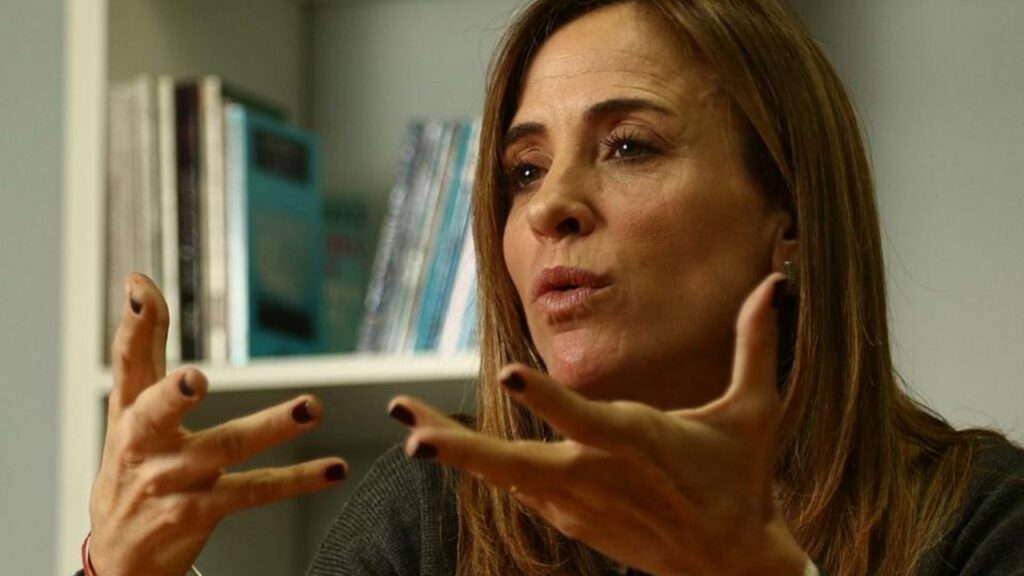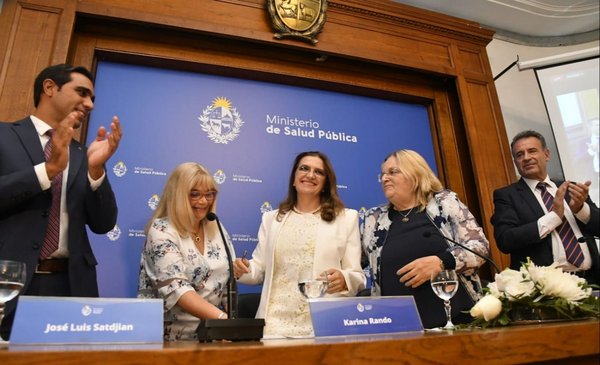The leader Henrique Capriles avoided commenting on the possibilities that the opposition candidate elected in the primaries, and is disqualified, go to the presidential elections without this ban being lifted, since he considers that it is part of a much broader agenda. He reiterated his rejection of a possible privatization of PDVSA, as several candidates for the primaries have proposed, including the leader María Corina Machado.
The former governor and presidential candidate of Primero Justicia (PJ), Henrique Capriles, defended this Monday the 13th his candidacy for the primaries of the Unitary Platform, scheduled for October 22, despite his political disqualification which, according to the Comptroller General of the Republic, culminates in 2032.
“I do not know what is going to happen. What I believe is that I cannot self-disable myself nor am I going to ask the Government for permission if I can run or not run (…) I am not going to wait for the decision of the discussion to go out to defend the cause and work for the cause,” Capriles said in a Press conferencewhere he also announced that he will start a tour throughout the country starting Tuesday 14 of March.
Capriles said that the bet of the Nicolás Maduro administration for these elections will be to promote abstention and the division of the opposition, as happened in the 2021 regional elections, but he is confident that it is possible to achieve political change.
“They are not going to make it easy. We are facing a 21st century dictatorship, a regime that behaves one way on some days and another on other days. That is why they have to appeal to institutional control, to the Comptroller’s Office, to the Prosecutor’s Office, “he explained.
The former governor, and two-time presidential candidate, avoided commenting on the possibilities that the opposition candidate elected in the primaries, and is disqualified, from going to the presidential elections without this ban being lifted, since he considers that it is part of a much broader agenda. .
«I am not going to disable hope. The thing about (Nicolás) Maduro is clear, it is sowing despair. That is what he is going to try to do in every public intervention, he is going to aim at the same ground: hopelessness, abstention, division, that he is the only one who can. Can he with what? This country does not belong to Maduro or the PSUV, nor does it belong to me. It belongs to everyone, those who are here and those who are outside, “he said.
He even said that he has not been part of conversations about obstacles to disqualified candidates within the opposition in this sense, in allusion to a comment by Diosdado Cabello. Capriles is disqualified by the Comptroller General, which implies a prohibition to run or hold publicly elected positions until 2032.
In any case, the leader appeared, this type of issue should go through negotiation in Mexico. «The negotiation in Venezuela is going to have to be a permanent process. We all know that in 2024 there must be elections. Do these elections have to be to end the crisis and the conflict or what are they going to be for? That has to be defined,” he noted.
He said that the obstacles to negotiations in Mexico are part of the official discourse, “being Delcy Rodríguez who handles the economic issue, Jorge Rodríguez must be aware of the problem (…) and for that, the conflict, the fight, must be resolved.”
He also noted that “the next few weeks” are shaping up to be decisive with regard to these issues. “If the obstacles to this process will be discussed or not. The big question is on the government side, which is the path they are going to take.
Capriles and the primaries
During the press conference, the former governor expressed his confidence that the National Commission for Primary Education will be able to bring all Venezuelans closer to this process, scheduled for October 22. In addition, he defended the request of this body for the National Electoral Council (CNE) to provide technical assistance.
«I think that the doctor (Jesús María) Casal and all the members of the Primary Commission have enough empathy so that those who live in Elorza (Apure), for example, can vote (…) That is why we need the voting centers and the help of the CNE for the primarybecause who believes that we are going to a primary without the CNE, but then we are going to a presidential one with the CNE,” said the leader of Primero Justicia.
At this moment, said the former governor, “there is a decision to be made: either face and fight or we decide not to. I decide to do it, democrats fight with the weapons that democracies give us, even though democracy has been taken from us.
He also said that it will be part of the debate in the coming months to reconcile positions between the candidates. «The primary is a stop, the primaries are not going to resolve the differences that exist (…) You have to depersonalize, obviously people are going to vote for someone, but you have to go beyond why they are going to vote ».
To date, seven parties and one independent candidate (Benjamín Rausseo) have confirmed their participation in the primary elections organized by the Platform through its National Primary Commission. In addition to Capriles, among the candidates are María Corina Machado (Vente Venezuela), Delsa Solórzano (Citizen Meeting), Juan Guaidó (Popular Will), Andrés Velásquez (La Causa R), César Pérez Vivas (Concertación Ciudadana) and Carlos Prosperi (Action Democratic).
Of them, only Prosperi has formally presented its government plan as a presidential candidate.
Refused to privatize Pdvsa
The leader Henrique Capriles reiterated his rejection of a possible privatization of PDVSA, as several candidates for the primaries have proposed, including the leader María Corina Machado (Vente Venezuela), considering that “care should be taken” with the belief that ” everything public is bad and everything private is good.
He maintained that “the private, poorly managed, can also close or go bankrupt. It is not a guarantee that a company is in private hands”, for which he commented that the administration of these companies is “key” to generate well-being.
“The problem is that Maduro handles oil as he wants. The issue is how we turn oil into a force to diversify the economy and allow the country to have the progress that we have been denied for so many years,” he said.
The PJ presidential candidate recalled that article 303 of the Constitution establishes the public ownership of PDVSA and that “any change in its situation would require consulting the Venezuelan people” through a constitutional amendment.
Post Views: 370
